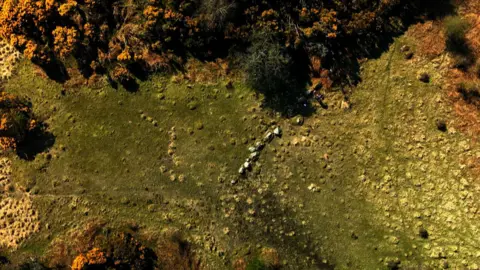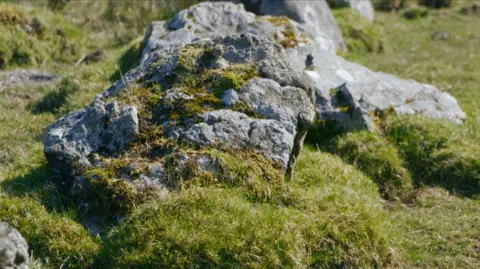BBC Scotland News
 Getty Images
Getty ImagesFootball’s coming home – or maybe it was here all along.
For centuries, those south of the border have laid claim to England being the founding place of the beautiful game.
Now a football historian believes the origins of the world’s most popular sport could lie in Scotland.
Ged O’Brien is convinced an outraged minister banned matches from being played in his parish in Kirkcudbrightshire in the 1600s – hundreds of years earlier than the modern game is thought to have emerged.
The site, at the former Mossrobin Farm close to Anwoth Kirk, was mentioned in a letter by Reverend Samuel Rutherford, who served between 1627 and 1638.
He arrived in the parish and was dismayed to find “there was a piece of ground on Mossrobin farm where on Sabbath afternoon the people used to play at foot-ball”.
It is claimed that the bemused pastor carried out the 17th Century equivalent of sticking up a “no ball games” sign, by ordering parishioners to move a line of stones across the pitch to prevent play.
 Studio Something/BBC
Studio Something/BBCWorking with a team of archaeologists, Mr O’Brien – who founded the Scottish Football Museum – discovered a line of 14 stones on the land.
Soil tests suggest they were placed there around the time of Rutherford’s order.
He said the discovery could force historians to “rewrite everything they think they know” about the game and its early development.
“I have always thought football has been played in Scotland for hundreds of years. Not mob-football, but proper football,” Mr O’Brien told BBC Scotland’s A View From The Terrace.
“It has always been very hard to prove it because working people never kept records.
“Rutherford is enraged by the fact his parishioners played football every Sunday.
“So one day he heads out after doing his preaching to remonstrate with them and say that ‘as the stones around him were his witness they were doing wrong’.”
 Studio Something/BBC
Studio Something/BBCAnwoth Kirk is about 32 miles (51km) from Palmerston Park, the home of Scottish League One side Queen of the South.
The Doonhamers were not formed until 1919, but matches have been played there since the late 1870s, when the football club of the Fifth Kirkcudbrightshire Rifle Volunteers played on the site.
However, if Mr O’Brien is correct, games at Anwoth would predate that by more than two centuries.
Even Baddiel and Skinner could not legislate for that 200 years of hurt.
 Studio Something/BBC
Studio Something/BBCIt would also be well ahead of the current Guinness World Record holder for oldest football ground.
Sheffield FC, formed in 1857 and widely accepted as the world’s oldest existing club, played against local rivals Hallam FC at Sandygate in Sheffield, South Yorkshire, on Boxing Day in 1860.
Three years later, in October 1863, the Football Association was founded in London by a group of former public school pupils from Eton and Harrow.
The Scottish Football Association was not formed until March 1873, a few months later.
The first officially recognised international fixture between the two countries was played at the West of Scotland Cricket Club’s ground in Partick, Glasgow.
 Studio Something/BBC
Studio Something/BBCHistorical records suggest much earlier versions of the game were played in ancient Greece, Rome, Mesoamerica and China.
That developed into what is now described as “mob-football,” but these were far-removed from anything resembling a modern match.
They were lawless, drunken rabbles involving a near-unlimited number of violent participants blindly charging after a ball usually made from an inflated animal bladder through the streets of a town or village.
However, in terms of a modern football match recognised around the world, Mr O’Brien says his discovery is hugely significant.
He said: “Anwoth is going to be one of the cornerstones of the new world history of football.
“The game they played is the game that everybody plays all around the world.
“You can be up the side of a mountain in the Himalayas watching a football game and the ghosts of Anwoth will be watching.”
A View From The Terrace airs tonight at 22:30 on the BBC Scotland channel.
Read full article at source
Stay informed about this story by subscribing to our regular Newsletter




